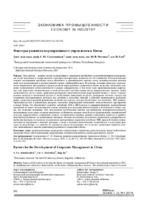| dc.contributor.author | Солодовников, С. Ю. | |
| dc.contributor.author | Мелешко, Ю. В. | |
| dc.contributor.author | Сюй, Ц. | |
| dc.coverage.spatial | Минск | ru |
| dc.date.accessioned | 2023-08-10T07:54:22Z | |
| dc.date.available | 2023-08-10T07:54:22Z | |
| dc.date.issued | 2023 | |
| dc.identifier.citation | Солодовников, С. Ю. Факторы развития корпоративного управления в Китае = Factors for the Development of Corporate Management in China / С. Ю. Солодовников, Ю. В. Мелешко, Ц. Сюй // Наука и техника. – 2023. – № 4. – С. 342-354. | ru |
| dc.identifier.uri | https://rep.bntu.by/handle/data/133574 | |
| dc.description.abstract | Цель работы – развить теорию корпоративного управления китайскими транснациональными корпорациями за счет выявления и содержательной характеристики факторов, влияющих на эти отношения. Методологической основой исследования выступили метод системного и сравнительного анализа, метод концептуализации научных идей, метод качественной и количественной оценки, субъектный подход. В качестве основных факторов, определяющих направления, инструменты и формы развития корпоративного управления в Китае, выделены следующие: усиление экономической взаимозависимости в рамках макрорегионов, в том числе через транснациональные корпорации, при нарастании экономического и геополитического противостояния между макрорегионами; высокие темпы экономического роста страны, требующие расширения транснациональных форм ведения бизнеса с целью стимулирования экспорта и обеспечения доступа к необходимым импортным ресурсам; расширение частного сектора при сохранении государственного контроля над активами в ключевых отраслях и развитие национального фондового рынка; проводимая кредитно-финансовая политика государства, которая обеспечивает для китайских ТНК привилегированный доступ к финансовым ресурсам; изменение конфигурации глобального технологического пространства в пользу Китая, что способствует развитию китайских ТНК в ИКТ-секторе и совершенствованию корпоративного управления на новой технологической основе; ведущая роль коммунистической партии в политической жизни страны, что позволяет китайским ТНК использовать политический капитал для повышения конкурентоспособности; национальные культурные и мировоззренческие особенности, которые способствуют формированию специфической культуры корпоративного управления (гуанси), отличающейся высоким уровнем социального капитала и ориентацией преимущественно на коллективные интересы. Новизна полученных результатов заключается в раскрытии разнообразия факторов и механизма их влияния на корпоративное управление китайских ТНК, высокой степени взаимозависимости внутренних и внешних факторов, а также в изучении экономических, политических и культурных факторов не обособленно, а в единстве их влияния на объект исследования, что позволяет значительно повысить качество экономического анализа развития корпоративного управления в Китае. | ru |
| dc.language.iso | ru | ru |
| dc.publisher | БНТУ | ru |
| dc.title | Факторы развития корпоративного управления в Китае | ru |
| dc.title.alternative | Factors for the Development of Corporate Management in China | ru |
| dc.type | Article | ru |
| dc.identifier.doi | 10.21122/2227-1031-2023-22-4-342-354 | |
| local.description.annotation | Рurpose of the work is to develop the theory of corporate management of Chinese transnational corporations (TNC) by identifying and substantive characteristics of the factors influencing these relations. The methodological main of research are systemic and comparative analysis, the method of conceptualization of scientific ideas, the method of qualitative and quantitative assessment, the subjective approach. The following are identified as the main factors determining the directions, tools and forms of development of corporate management in China: strengthening economic interdependence within macroregions, including through transnational corporations, with the growth of economic and geopolitical confrontation between macro-regions; high rates of economic growth of the country, requiring the expansion of transnational forms of doing business in order to stimulate exports and provide access to the necessary import resources; expansion of the private sector while maintaining state control over assets in key industries and the development of the national stock market; the ongoing credit and financial policy of the state, which provides Chinese TNCs with privileged access to financial resources; reconfiguration of the global technological space in favor of China, which contributes to the development of Chinese TNCs in the ICT (information and communication technologies) sector and the improvement of corporate management on a new technological basis; the leading role of the Communist Party in the political life of the country, which allows Chinese TNCs to use political capital to increase competitiveness; national cultural and worldview features that contribute to the formation of a specific culture of corporate management (guangxi), characterized by a high level of social capital and a focus primarily on collective interests. The novelty of the results obtained lies in the disclosure of a variety of factors and the mechanism of their influence on the corporate management of Chinese TNCs, a high degree of interdependence of internal and external factors, as well as in the study of economic, political and cultural factors not in isolation, but in the unity of their influence on the object of study, which allows significantly improve the quality of economic analysis of the development of corporate management in China. | ru |

